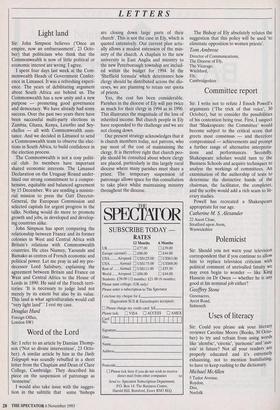LETTERS Light land
Sir: John Simpson believes ('Once an empire, now an embarrassment', 23 Octo- ber) that politicians who think that the Commonwealth is now of little political or economic interest are wrong. I agree.
I spent four days last week at the Com- monwealth Heads of Government Confer- ence in Limassol. It was a refreshing experi- ence. The years of debilitating argument about South Africa are behind us. The Commonwealth has a new unity and a new purpose — promoting good governance and democracy. We have already had some success. Over the past two years there have been successful multi-party elections in Zambia, Ghana, Kenya, Lesotho and Sey- chelles — all with Commonwealth assis- tance. And we decided in Limassol to send a Commonwealth team to observe the elec- tions in South Africa, to build confidence in the election process.
The Commonwealth is not a cosy politi- cal club. Its members have important shared economic interests. The Limassol Declaration on the Uruguay Round under- lined our strong commitment to a compre- hensive, equitable and balanced agreement by 15 December. We are sending a ministe- rial mission to press the Gatt Director- General, the European Commission and selected capitals for urgent progress in the talks. Nothing would do more to promote growth and jobs, in developed and develop- ing countries alike.
John Simpson has sport comparing the relationship between France and its former colonies in West and Central Africa with Britain's relations with Commonwealth countries. He cites Niamey, Yaounde and Bamako as centres of French economic and political power. Let me pray in aid my pre- decessor Lord Salisbury, explaining the agreement between Britain and France on West and Central Africa to the House of Lords in 1890. He said of the French terri- tories: 'It is necessary to judge land not merely by its extent but also by its value. This land is what agriculturalists would call "very light land".' I rest my case.
Douglas Hurd
Foreign Office, London SWI










































































 Previous page
Previous page